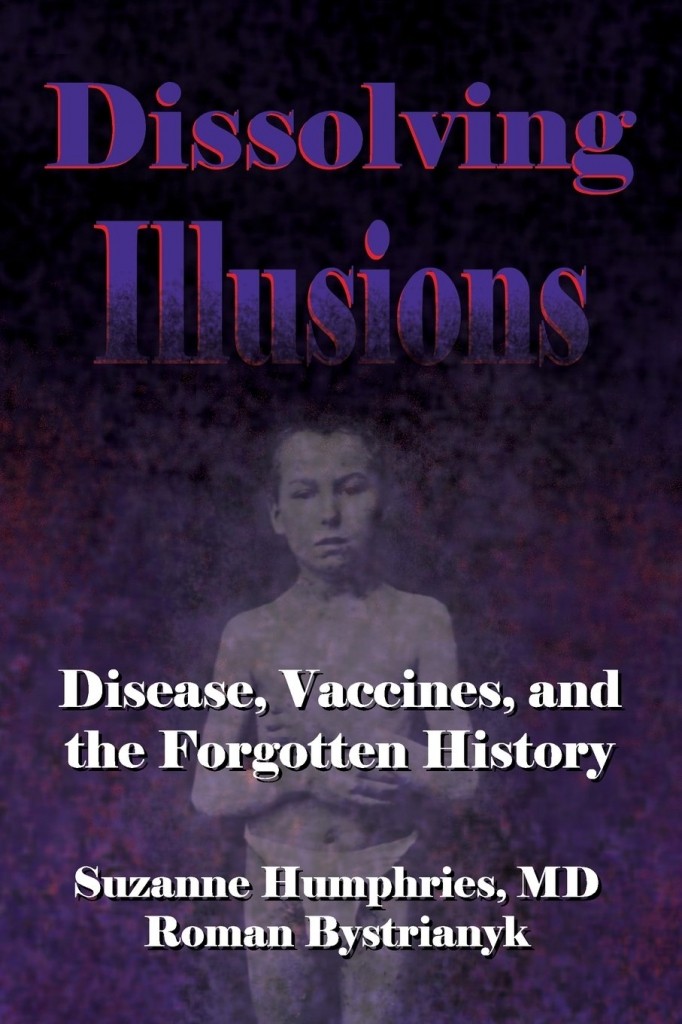ANOTHER Epic Fail for Influenza Vaccine
By Barbara Loe Fisher
National Vaccine Information Center
Here we are in the winter of 2015 and U.S. public health officials admit that the historically ineffective influenza vaccine is once again an epic fail.1 2
Flu Vaccine Effectiveness Measured from 0 to 62 Percent
.jpg.aspx?width=150&height=224) In the past three flu seasons, the CDC has claimed the flu vaccine’s overall effectiveness clocked in at between 47 and 62 percent3 while some experts have measured it at 0 to 7 percent.4 Other studies suggest that when children get a flu shot every year it can interfere with healthy immune responses and make them more likely to get influenza in certain flu seasons.5 6 Independent medical literature reviews document that flu shots don’t really prevent influenza or complications of influenza7 8 or influenza-like-illness (ILI) associated with other types of viruses that cause about 80% of all respiratory or gastrointestinal infections during any given flu season.9 10 11 12
In the past three flu seasons, the CDC has claimed the flu vaccine’s overall effectiveness clocked in at between 47 and 62 percent3 while some experts have measured it at 0 to 7 percent.4 Other studies suggest that when children get a flu shot every year it can interfere with healthy immune responses and make them more likely to get influenza in certain flu seasons.5 6 Independent medical literature reviews document that flu shots don’t really prevent influenza or complications of influenza7 8 or influenza-like-illness (ILI) associated with other types of viruses that cause about 80% of all respiratory or gastrointestinal infections during any given flu season.9 10 11 12A car in which seatbelts and brakes only worked at best half the time is not a car Americans would choose to buy or drive. Car manufacturers profiting from selling that kind of defective product would be sued in civil court and rightly so.
Americans Forced to Get Flu Shots or Suffer Sanctions
 Yet, U.S. public health officials are making flu vaccine policy that gets turned into law.13 14They are forcing Americans to buy and use a pharmaceutical product that fails to work as advertised time and again and can brain injure people, too.15 16 17 But we can’t sue drug companies for vaccine failures, brain injuries and deaths in civil court.18 Many of us are being fired from our jobs or denied an education, childcare and medical care if we refuse to salute smartly and get a flu shot every year or give it to our children.19 20 21 22
Yet, U.S. public health officials are making flu vaccine policy that gets turned into law.13 14They are forcing Americans to buy and use a pharmaceutical product that fails to work as advertised time and again and can brain injure people, too.15 16 17 But we can’t sue drug companies for vaccine failures, brain injuries and deaths in civil court.18 Many of us are being fired from our jobs or denied an education, childcare and medical care if we refuse to salute smartly and get a flu shot every year or give it to our children.19 20 21 22Dominant Influenza A Strain NOT In Current Flu Shot
Every spring, federal health officials select two influenza A virus strains (usually H1N1 and H3N2 subtypes)23 and one or two influenza B virus strains24 to include in flu vaccines released in the fall. This past December, CDC officials held a press conference and informed Americans that they were unaware last spring that one of the influenza A strains selected for the 2014/2015 flu vaccine – the H3N2 subtype – was starting to “drift.” It turns out that the genetically mutated subtype is the dominant influenza A strain causing sickness this year but it is not in the flu vaccine.25 26 2728
Some Experts Warn Flu Shot Does NOT Make Symptoms Less Severe
Bottom line: If you or your child got a flu shot this year, it does not protect you from the most common influenza A subtype making people sick. And now, some influenza experts are warning that flu shots do not make symptoms less severe if the vaccine fails to prevent influenza infection.29
2003/2004 Flu Shot Failure: Same Story
Is this the first time that federal health officials have been aware that the influenza A H3N2 subtype constantly mutates and is often the dominant strain of flu that circulates in the U.S.? No, it’s not.
 Let’s go back and take a look at the 2003/2004 flu season’s epic influenza vaccine fail. In the spring of 2003, federal health officials did know ahead of time that the influenza A Panama strain they chose for the seasonal flu vaccine was not a match for the emerging mutated H3N2 Fujian strain making people very sick. Influenza experts told the FDA vaccine advisory committee (VRBPAC) that two genetic mutations in the H3N2 strain would likely cause the flu shot to fail if it was not included in the vaccine.[30]
Let’s go back and take a look at the 2003/2004 flu season’s epic influenza vaccine fail. In the spring of 2003, federal health officials did know ahead of time that the influenza A Panama strain they chose for the seasonal flu vaccine was not a match for the emerging mutated H3N2 Fujian strain making people very sick. Influenza experts told the FDA vaccine advisory committee (VRBPAC) that two genetic mutations in the H3N2 strain would likely cause the flu shot to fail if it was not included in the vaccine.[30]As the consumer voting member at that March 2003 FDA committee meeting, I abstained from the influenza vaccine strain selection vote because the influenza A strain being recommended was not a match for the emerging mutated H3N2 strain and said I thought the public should be told. 31 So what was the government’s rationale for allowing drug companies to produce a flu vaccine they knew was likely a non-starter from the very beginning?
Well, the vaccine manufacturers said they couldn’t include the mutated H3N2 subtype in the vaccine because they would miss the fall 2003 delivery and marketing deadline! In other words, it was all about protecting a multi-billion dollar flu vaccine market and not about truth in advertising.
Flu vaccine effectiveness for the 2003/2004 season was described by health officials as 3% to 14%, which does qualify as an epic fail.32
2012/2013 Flu Shot Failure: Vaccine Manufacturing Problem
Now let’s look at the 2012/2013 flu season, when flu vaccine effectiveness was 50% and only 41% in preventing the H3N2 subtype that caused most of the disease that season. A little digging into the medical literature reveals that the H3N2 subtype problem was not due to a natural antigenic drift like CDC officials are claiming it is this season. No, flu vaccine failure two years ago was about mutations in the egg adapted H3N2 vaccine strain used by drug companies to produce the vaccine. 33
In other words, it was a vaccine manufacturing problem. Drug companies introduced H3N2 mutations through the vaccine manufacturing process, creating a mismatch between the circulating H3N2 strain and the vaccine strain.
Congress Funds Aggressive Influenza Vaccine Push on Americans
 How honest is the CDC being with legislators voting to give federal health agencies and drug companies billions of dollars to produce influenza vaccines34 35 36 37 38 39 that are being aggressively pushed on all Americans, including infants, children, pregnant women and health care workers40 41 42 43using a pathetically poor evidence base?44 45 46
How honest is the CDC being with legislators voting to give federal health agencies and drug companies billions of dollars to produce influenza vaccines34 35 36 37 38 39 that are being aggressively pushed on all Americans, including infants, children, pregnant women and health care workers40 41 42 43using a pathetically poor evidence base?44 45 46Influenza Viruses Always Mutating, Vaccine Strain Virus Shedding
Influenza viruses that infect humans and animals are always mutating and evolving, recombining with each other and creating new influenza strains being shed and transmitted in body fluids and waste products of animals and humans.47 48 49 50 51 Vaccine strain influenza viruses can recombine with other viruses as well,52 particularly those shed and transmitted by children and adults given live influenza virus vaccines53 54 55 56 and by experimental live virus vectored vaccines being created in labs, with unknown effects on humans, animals and the environment.57 58 59 60
GMO Flu Vaccines, Risky Adjuvants: Follow the Money
 And yet, billions of dollars are being spent by government and industry to build more flu vaccine plants to create genetically engineered flu vaccines that contain insect and animal DNA, foreign proteins61 62 63 64 65 and novel adjuvants designed to hyper-stimulate human immune responses.66 67 68 69 70 In an irrational crusade to outsmart influenza viruses, vaccine risks are increasing71 while vaccine failures continue to haunt the entire money-driven enterprise. 72 73 74
And yet, billions of dollars are being spent by government and industry to build more flu vaccine plants to create genetically engineered flu vaccines that contain insect and animal DNA, foreign proteins61 62 63 64 65 and novel adjuvants designed to hyper-stimulate human immune responses.66 67 68 69 70 In an irrational crusade to outsmart influenza viruses, vaccine risks are increasing71 while vaccine failures continue to haunt the entire money-driven enterprise. 72 73 74Repeal Flu Shot Mandates, Hold Companies Accountable
After decades of government propaganda trumpeting the benefits and minimizing the risks of annual flu shots, one-size-fits-all, cradle to the grave influenza vaccine recommendations should be revised. Flu shot mandates should be repealed and vaccine manufacturers held accountable for vaccine risks and failures in civil court.
Read the Full Article Here.
1 CDC. Transcript of CDC Telebriefing: Update on Flu Season 2014-2015. Dec. 4, 2014.
2 CDC. Situation Update: Summary of Weekly Flu View. Jan. 5, 2015.
3 CDC. Seasonal Influenza: Past Flu Seasons (2006-2014). Aug. 26, 2013.
4 Cooper M. DOD Influenza Surveillance and Vaccine Effectiveness. Presentation to FDA Vaccines and Related Biological Products Advisory Committee (Slide 28) Feb. 27, 2014.
5 Bodewes R, Fraaij PLA, Geelhoed-Mieras MM et al. Annual Vaccination against Influenza Virus Hampers Development of Virus-Specific CD8+ T Cell Immunity in Children. J Virol 2011; 85(22).
6 The Canadian Press. Flu shot linked to higher incidence of flu in pandemic year. CBCNews Sept. 11, 2012.
7 Jefferson T, DiPietrantonj C, Rivetti A et al. Vaccines for preventing influenza in health adults. The Cochrane Library July 7, 2010.
8 Jefferson T., Rivetti A, Di Pietrantonij C et al. Vaccines for preventing influenza in healthy children. Cochrane Database of Systematic Reviews 2012; Issue 8.
9 FDA. 94th Meeting of Vaccines and Related Biological Products Advisory Committee Transcript. Feb. 20, 2003.
10 CDC. Seasonal Influenza Q&A. Aug. 15, 2014.
11 CDC. 2014-2015 Influenza Season Week 51 Ending December 20, 2014. FluView Weekly U.S. Influenza Surveillance ReportDec. 29, 2014.
12 Doshi P. Influenza Vaccine Time for a Rethink. JAMA Intern Med 2013; 173(11): 1014-1016.
14 Immunization Action Coalition (IAC). States with Influenza Vaccine Mandates for Childcare Dec. 1, 2010. States of Influenza Vaccine Mandates for Residents in Long Term Care Facilities June 8, 2008.
15 Machicado JD, Bhagya-Rao B, Davagustto G, McKelvy BJ. Acute Disseminated Encephalomyelitis following seasonal Influenza Vaccination in an Elderly Patient. Clin Vaccine Immunol 2013; 20(9): 1485-1486.
18 BusinessWire Enhanced Online News. National Vaccine Information Center (NVIC) Cites ‘Betrayal’ of Consumers by US Supreme Court Giving Liability Shield to Big Pharma. NVIC Press Release Feb. 23, 2011.
19 Immunization Action Coalition. Influenza Vaccination Honor Roll: Mandating Influenza Vaccination for Healthcare Personnel. Feb. 6, 2014.
20 Johns Hopkins. Mandatory Flu Vaccination.
21 The Inquisitr. New York City to Mandate Flu Shots for PreSchool Children. Oct. 10, 2014.
22 Shelton DL. Some pediatricians stand for vaccine program: Doctors at certain practices refuse to treat kids when parents refuse immunization schedule. Chicago Tribune July 6, 2011.
23 Zimmer SM, Burke DS. Historical Perspectives – Emergence of Influenza A (H1N1) Virus. N Eng J Med 2009; 381: 279-285.
24 CDC. Types of Influenza Viruses. Aug. 19, 2014.
25 CDC Health Alert Network. CDC Health Advisory Regarding the Potential for Circulation of Drifted Influenza A (H3N2) Viruses. Dec. 3, 2014.
26 CDC. Transcript of CDC Telebriefing: Update on Flu Season 2014-2015. Dec. 4, 2014.
27 CDC. How the Flu Virus Can Change: “Drift” and “Shift.” Aug. 19, 2014.
28 Clancy S. Genetics of Influenza Virus. Nature Education 2008; 1(1): 83.
29 Roos R. CDC’s flu warning raises questions about vaccine match. CIDRAP Dec. 5, 2014.
30 Fisher BL. Flu Vaccine: Missing the Mark. NVIC: The Vaccine Reaction Newsletter Spring 2004.
31 FDA. Vaccines and Related Biological Products Advisory Committee Meeting Transcript. March 18, 2003.
32 CDC. Preliminary Assessment of the Effectiveness of the 2003-04 Inactivated Influenza Vaccine – Colorado, December 2003. MMWR Jan. 16, 2004; 52(01): 8-11.
33Skowronski DM, Janjou NZ, DeSerres C et al. Influenza Vaccine Effectiveness Associated with Mutations in the Egg Adapted H3N2 Vaccine Strain Not Antigenic Drift in Circulating Viruses. PLOS One Mar. 25, 2014.
34 Lister S. Pandemic Influenza Appropriations for Public Health Preparedness and Response. Congressional Research Service Jan. 23, 2007.
35 Homeland Security News Wire. Sanofi Pasteur to open new flu vaccine plant. Aug. 14, 2007.
36 Roos R. Congress Approves $7.65 billion for pandemic flu response. CIDRAP June 22, 2009.
37 Palmer E. GSK gets OK for $91M vaccine plant with Texas A&M. Fierce Pharma Manufacturing Mar. 27, 2013.
38 Palmer E. FDA approves Novartis U.S. vaccine plant it is trying to sell: Feds have invested about $500M into the $1B complex. Fierce Pharma Manufacturing June 16, 2014.
39 PharmaBix.com. US BARDA extends contract with Protein Sciences to support development of flu vaccines. June 19, 2014.
40 CDC Division of Media Relations. CDC’s Advisory Committee on Immunization Practices (ACIP) Recommends Universal Annual Influenza Vaccines. CDC Press Release: Feb. 24, 2010.
41 CDC. Prevention and Control of Seasonal Influenza with Vaccines: Recommendations of the Advisory Committee on Immunization Practices (ACIP) – United States, 2014-15 Influenza Season. MMWR Aug. 15, 2014; 63(32): 691-697.
43 CDC. 2014 Recommended Immunizations for Adults. Sept. 18, 2014.
44 Fisher BL. Influenza Deaths: The Hype vs. The Evidence. NVIC Newsletter Oct. 3, 2012.
45 LaVigne P. Expert Says Influenza Vaccine Maker Misrepresents Facts. NVIC Newsletter June 25, 2013.
46 Fisher BL. Vaccination During Pregnancy: Is It Safe? NVIC Newsletter Nov. 9, 2013.
47 World Health Organization. Influenza. Oct. 2, 2014.
48 Centers for Disease Control. Transmission of Influenza Viruses from Animals to Humans. Aug. 19, 2014.
49 Fox M. Virus experiment reminds that flu surprises await. Reuters Feb. 23, 2010.
50 Bouvier NM, Lowen AC. Animal Models for Influenza Virus Pathogenesis and Transmission. Viruses 2010; 2: 1530-1563.
51 Fisher BL. The Emerging Risks of Live Virus and Virus Vectored Vaccines: Vaccine Strain Virus Infection, Shedding and Transmission. NVIC.org. Nov. 10, 2014.
52 He CQ, Han GZ, Wang D et al. Homologous recombination evidence in human and swine influenza A viruses. Virology 2008; 380(1): 12-20.
53 Stahl S. Health: New CDC Flu Vaccine Recommendation For Young Children. CBS-Philadelphia Sept. 18, 2014.
54 CDC. Prevention and Control of Seasonal Influenza with Vaccines: Recommendations of the Advisory Committee on Immunization Practices (ACIP) – United States, 2014-15 Influenza Season. MMWR Aug. 15, 2014; 63(32): 691-697.
55 Ali T, Scott N, Kallas W et al. Detection of Influenza Antigen with Rapid Antibody-Based Tests After Intranasal Influenza Vaccination (FluMist). Clin Infect Dis 2004; 38(5): 760-762.
56 Suess T., Remschmidt C, Schink S et al. Comparison of Shedding Characteristics of Seasonal Influenza Virus (Sub) Types and Influenza A (H1N1) pdm09; Germany, 2007-2011. PLOS One 2012; 7(12).
57 Lauring AS, Jones JO, Andino R. Rationalizing the development of live attenuated virus vaccines. Nature Biotech 2010; 28: 573-579.
58 Tripp RA, Tompkin SM. Virus Vectored Influenza Vaccines. Viruses 2014; 6: 3055-3079.
59 Saxena M, Van TTH, Baird FJ et al. Pre-existing immunity against vaccine vector: friend or foe? Microbiol 2013; 159: 1-11.
60 Myhr AI, Traavik T. Genetically Engineered Virus-Vectored Vaccines – Environmental Risk Assessment and Management Challenges. In: Genetic Engineering – Basics, New Applications and Responsibilities. In Tech 2012.
62 Protein Sciences Corp. Flublok (Influenza Vaccine) Package Insert Description. 2013.
63 Margine I, Luis-Martinez-Gil, Chou Y, Kramer F. Residual Baculovirus in Insect Cell-Derived Influenza Virus-Like Particles Preparation Enhances Immunogenicity. PLOS One2012; 7(12).
64 Novartis Vaccines. Flucelvax (Influenza Vaccine) Package Insert. Description March 2014.
65 Park A. Some people may get a new flu shot that made with dog cells instead of chicken eggs. Time Oct. 30, 2014.
66 LaVigne P. FDA Approves Experimental H5N1 Bird Flu Vaccine with Reactive AS03 Adjuvant for U.S. Stockpiles. NVIC Newsletter Dec. 9, 2013.
67 Tetsutani K, Ishi KJ. Adjuvants in influenza vaccines. Vaccine 2012; 30(52): 7658-7661.
68 Vano M, Taccone M, Caccin P et al. The adjuvant MF59 induces ATP release from muscle that potentiates responses to vaccination. Proc Natl Acad Sci USA 2013; 110(52): 21095-21100.
69 Taylor NP. Narcolepsy link to GSK vaccine raises doubts about next-gen adjuvants. Fierce Vaccines Mar. 11, 2013.
70 Ahmed SS, Schur PH, MacDonald NE, Steinman L. Narcolepsy, 2009 A(H1N1) pandemic influenza, and pandemic influenza vaccinations: What is known and unknown about the neurological disorder, the role for autoimmunity and vaccine adjuvants. Journal of Autoimmunity May 2014; 1-11.
72 PR Newswire. Market Forecast: Seasonal Influenza Vaccines Sept. 2, 2012.
73 True JM. Succeeding in the Global Vaccines Market. Capgemini Consulting Aug. 6, 2013.
74 Yahoo Finance. Pharma Point: Seasonal Influenza Vaccines: Global Drug Forecast and Market Analysis to 2022: Event Driven Update. PR Newswire Feb. 26, 2014.
Dissolving Illusions: Disease, Vaccines, and The Forgotten History
by Dr. Suzanne Humphries and Roman Bystrianyk
Free Shipping Available!
Learn More
Published on January 8, 2015





One Comment